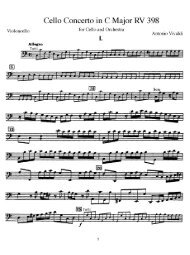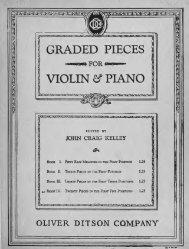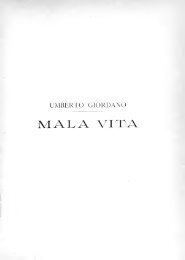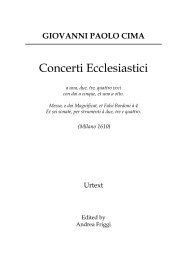- Page 1:
MUSICALCOMPOSITIONA SHORT TREATISE
- Page 6 and 7:
OB&PTDCONTENTS.AQ_I. INTRODUCTORY 1
- Page 9:
INTRODUCTORY 3and should be kept wh
- Page 13 and 14:
TECHNIQUE 7Harmony which results fr
- Page 15 and 16:
TECHNIQUE 9or, in slightly more orn
- Page 18:
12 MUSICAL COMPOSITIONauricular, ar
- Page 21 and 22:
TECHNIQUE 15if t of the string lies
- Page 23 and 24:
TECHNIQUE 17coincide absolutely wit
- Page 25 and 26:
TECHNIQUE 19To the inexperienced li
- Page 27 and 28:
TECHNIQUE 21first entries of the su
- Page 29 and 30:
CHAPTER IIIRHYTHMIF melody is the l
- Page 31 and 32:
RHYTHM 25with the unmistakeable ind
- Page 33 and 34:
II p~RHYTHM 27tt.: J J -f4 J.: JoB(
- Page 35:
RHYTHM 29(As the tune given above i
- Page 38 and 39:
32 MUSICAL COMPOSITIONsmall things
- Page 40 and 41:
34 MUSICAL COMPOSITIONbe doubly and
- Page 42 and 43:
36 MUSICAL COMPOSITION(That is, on
- Page 44 and 45:
38 MUSICAL COMPOSITIONfirst four no
- Page 46 and 47:
40 MUSICAL COMPOSITION---This tune,
- Page 48 and 49:
42 MUSICAL COMPOSITIONAll the other
- Page 50 and 51:
44 MUSICAL COMPOSITIONNote how the
- Page 52 and 53:
!l6 MUSICAL COMPOSITIONWhen he uses
- Page 54 and 55:
4:8 MUSICAL COMPOSITIONmake your ph
- Page 56 and 57:
50 MUSICAL COMPOSITIONThis kind of
- Page 58 and 59:
52 MUSICAL COMPOSITIONThe greatest
- Page 60 and 61:
54 MUSICAL COMPOSITIONOf the fourth
- Page 62 and 63:
56 MUSICAL COMPOSITIONmust have the
- Page 64 and 65:
58 MUSICAL COMPOSITIONhowever, as t
- Page 66 and 67:
60 MUSICAL COMPOSITIONVar.8. Semi q
- Page 68 and 69:
62 MUSICAL COMPOSITIONVar. 22. Rela
- Page 70 and 71:
64 MUSICAL COMPOSITIONmust be kept
- Page 72 and 73:
66 MUSICAL COMPOSITIONis treated in
- Page 74 and 75:
68 MUSICAL COMPOSITION5. Chord puls
- Page 76 and 77:
70 MUSICAL COMPOSITIONpervades the
- Page 78 and 79:
72 MUSICAL COMPOSITIONintervals. Th
- Page 80 and 81:
CHAPTER VIFORMIT is not within the
- Page 82 and 83:
76 MUSICAL COMPOSITIONand intangibl
- Page 84 and 85:
78 MUSICAL COMPOSITIONmusical equiv
- Page 86 and 87:
80 MUSICAL COMPOSITIONI. PROPORTION
- Page 88 and 89:
BarB.17.18. }19.20. I21. J22-25.25,
- Page 90 and 91:
B&rII.84 MUSICAL COMPOSITIONThe dif
- Page 92 and 93:
86 MUSICAL COMPOSITIONBars.85. A va
- Page 94 and 95:
88 MUSICAL COMPOSITIONBars.213-219.
- Page 96 and 97:
goMUSICAL COMPOSITIONto the topmost
- Page 98 and 99:
92 MUSICAL COMPOSITION.Write in the
- Page 100 and 101:
~ MUSICAL COMPOSITIONFreedom which
- Page 102 and 103:
96 MUSICAL COMPOSITIONpainting can
- Page 104 and 105:
18 MUSICAL COMPOSITIONartist; the c
- Page 106 and 107:
100 MUSICAL COMPOSITIONguide does o
- Page 108 and 109:
102 MUSICAL COMPOSITIONthe other ha
- Page 110 and 111:
104 MUSICAL COMPOSITIONI. Violin}II
- Page 112 and 113:
106 MUSICAL COMPOSITIONequally surp
- Page 114 and 115:
108 MUSICAL COMPOSITIONBefore passi
- Page 116 and 117:
110 MUSICAL COMPOSITIONscattered nu
- Page 118 and 119:
112 MUSICAL COMPOSITIONcomplete fre
- Page 120 and 121:
114 MUSICAL COMPOSITIONthe Irishman
- Page 122 and 123:
116 MUSICAL COMPOSITIONin the relat
- Page 124 and 125:
118 MUSICAL COMPOSITIONinto brillia
- Page 126 and 127: 120 MUSICAL COMPOSITIONa whole phra
- Page 128 and 129: 122 MUSICAL COMPOSITIONwant it for
- Page 130 and 131: 124 MUSICAL COMPOSITIONwhich, if th
- Page 132 and 133: 126 MUSICAL COMPOSITIONof hearing t
- Page 134 and 135: 128 MUSICAL COMPOSITIONbe arrived a
- Page 136 and 137: 130 MUSICAL COMPOSITIONBut doth suf
- Page 138 and 139: 132 MUSICAL COMPOSITIONIn the words
- Page 140 and 141: 134 MUSICAL COMPOSITION, ,(The acce
- Page 142 and 143: 136 MUSICAL COMPOSITIONits colour a
- Page 144 and 145: 138 MUSICAL COMPOSITIONby the accom
- Page 146 and 147: 140 MUSICAL COMPOSITIONwhich will f
- Page 148 and 149: 142 MUSICAL COMPOSITIONwith the fas
- Page 150 and 151: 144 MUSICAL COMPOSITIONthe first th
- Page 152 and 153: 146 MUSICAL COMPOSITIONdirection of
- Page 154 and 155: 148 MlJSICAL CO~IPOSITIO~in the six
- Page 156 and 157: 150 MUSICAL COMPOSITIONwhen softnes
- Page 158 and 159: 152 MUSICAL COMPOSITIONSt. Matthew
- Page 160 and 161: 154 MUSICAL COMPOSITIONor slur his
- Page 162 and 163: 156 MUSICAL COMPOSITIONbrilliant di
- Page 164 and 165: 158 MUSICAL COMPOSITIONhis subordin
- Page 166 and 167: 160 MUSICAL COMPOSITIONthey precede
- Page 168 and 169: 162 MUSICAL COMPOSITIONpaper, and t
- Page 170 and 171: 164 MUSICAL COMPOSITIONBet himself
- Page 172 and 173: 166 MUSICAL COMPOSITIONof the great
- Page 174 and 175: 168 MUSICAL COMPOSITIONis equally s
- Page 178 and 179: 172 MUSICAL COMPOSITIONthrough a ch
- Page 180 and 181: 174 MUSICAL COMPOSITIONperformers h
- Page 182 and 183: 176 MUSICAL COMPOSITIONand do not u
- Page 184 and 185: 178 MUSICAL COMPOSITIONhigh. Every
- Page 186 and 187: ISOMUSICAL COMPOSITIONsuggestions f
- Page 188 and 189: 182 MUSICAL COMPOSITIONtonic will b
- Page 190 and 191: 184 MUSICAL COMPOSITIONto F major,
- Page 192 and 193: 186 MUSICAL COMPOSITIONinvention wh
- Page 194 and 195: 188 MUSICAL COMPOSITION(§ 18) Last
- Page 196 and 197: 190 MUSICAL COMPOSITIONare sincerit
- Page 198 and 199: 192 INDEXHaydn, Joeef, 12, 63, 77,



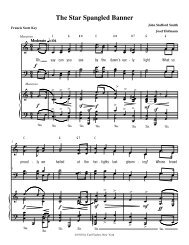
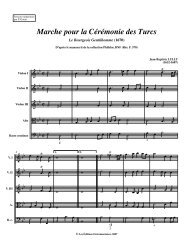
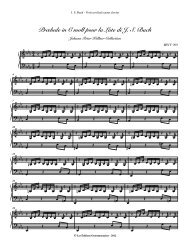
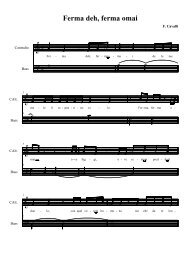
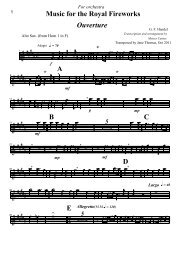
![Finale 2008a - [PENTACORDIOS Y ESCALAS]](https://img.yumpu.com/31639986/1/184x260/finale-2008a-pentacordios-y-escalas.jpg?quality=85)
